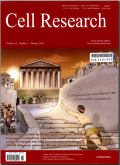Ubiquitin-induced phase separation of p62/SQSTMl
During the process of autophagy, cytoplasmic material is targeted by autophagic receptor proteins, which were thought to segregate the cargo by forming aggregates. Recent evidence suggests that cargo is actually concentrated and segregated into protein condensates by ubiquitin chain-induced phase separation of autophagy receptor p62.Autophagy is vital for cellular homeostasis, as damaged proteins or organelles are engulfed, and degraded, and nutrients are recycled.1 Autophagosomal membranes form and expand at the site of cytosolic disposal and are critical for separation and delivery of cargo to the lysosome. Autophagosomes are characterized by double lipid membranes conjugated with the Atg8 family of ubiquitin-like modifiers. There are six members of autophagy modifiers in mammalian cells (named LC3s and GABARAPs) that can bind to a variety of autophagy receptor or adaptor proteins through their LIR (LC3-interacting region) motif.2,3 One such autophagy receptor protein is p62 or SQSTM1. p62 is a multi-modular protein, which harbors a LIR motif, a PB1 (Phox and Beml) domain used for oligomerization and a UBA (ubiquitin-associated) domain to bind ubiquitin chains. Through these various domains, p62 links and recruits ubiquitylated cytosolic cargo material to the autophagic isolation membrane.4,5 The oligomerization of p62 through the PB1 domain generates higher avidity interactions with ubiquitin and LC3-coated surfaces.6 p62 preferentially binds to K63-linked ubiquitin chains, which are generated by the action of E1, E2 and E3 enzymes that link a ubiquitin molecule on lysine 63 to the N-terminus of the next ubiquitin molecule. Proteins destined for degradation are usually decorated with ubiquitin chains, which are recognized by the proteasome or autophagy receptor proteins, e.g., p62 binds to the ubiquitylated cargo proteins and forms protein aggregates, which are then degraded by autophagy. Upon autophagic malfunctions or p62 mutations, p62 protein aggregates are a common component of cellular inclusion bodies found in several diseases affecting the brain and liver.
28
2018-08-29(万方平台首次上网日期,不代表论文的发表时间)
共2页
389-390






